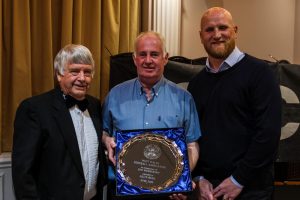A FORMER inmate and prison reform advocate has been sentenced for posting a video of a staff member restraining a prisoner on social media.
Zachery “Zac” Griffiths, 32, of Llanelli, Carmarthenshire, shared the footage on a public Facebook group, sparking a legal backlash.
Griffiths, of Golygfor, Llanelli, was arrested and said he had received the information from those inside the prison. He said he knew it was illegal to post the footage online but he believed it was in the public interest.
The defendant later pleaded guilty to transmitting or causing the transmission of an image or sound from a prison contrary to the Prison Act 1952, and causing to be sent by public communication network an offensive, indecent, obscene, menacing message or matter.
The court heard he has 50 previous convictions including malicious communications, possessing a prohibited item in prison and drug offences.
In a victim personal statement read to the court, the victim said: “The incident has had a lasting effect on my life, my anxiety is terrible especially at night time. Every time I heard a noise my anxiety would go through the roof. I’m constantly paranoid and checking the windows and doors are locked. I check the windows to see if anyone is outside.”
Cardiff Crown Court sentenced Griffiths to 12 months, with half to be served in custody.
Griffiths, a prominent figure in prison reform, admitted to posting the video and to making false claims about a staff member at HMP Parc, a private prison in Bridgend, where he was previously incarcerated.
The court also issued a restraining order prohibiting Griffiths from contacting or referencing the worker, who endured significant distress due to Griffiths’ posts.
Griffiths, who served time from 2016 to 2020 and again until 2023 on charges including conspiracy to supply Class A drugs, became an advocate for prison reform following his release.
He founded the HMP Prisons Justice Group UK, which operates primarily through a Facebook group with over 6,000 members.
Many members are families of inmates or of individuals who died in custody, and the group campaigns for reform and raises awareness of prison conditions, focusing especially on HMP Parc.

Seventeen inmates are known to have died at Parc so far this year – more than at any other prison.
The security company G4S, which runs HMP Parc, confirmed this number. It is understood eight deaths were of natural causes.
Three prisoners were also taken to hospital following disorder at the prison in June.

Griffiths’ posts falsely accused the prison support worker and her family of drug-related activities.
According to prosecutor Pamela Kaiga, the victim experienced severe anxiety, taking nine weeks off work—her first sick leave in nine-and-a-half years with G4S, the private firm managing Parc Prison.
She reported fearing for her safety and that of her daughter, and her family faced harassment in public due to Griffiths’ claims.
Throughout his advocacy, Griffiths has been vocal about what he describes as “toxic” conditions within HMP Parc, alleging issues with drug access, corruption, and inadequate rehabilitation.
He has specifically pointed to rising availability of harmful substances like fentanyl, claiming that prison authorities fail to address these issues effectively. Griffiths argues for a shift toward rehabilitation-focused incarceration, which he claims is crucial for preparing inmates to reenter society.

Representing himself in court, Griffiths claimed he posted the video to expose troubling conditions within the prison, asserting that his actions were in the public interest.
However, Judge Tracey Lloyd-Clarke rejected his defense, stating, “You are not making a speech for your campaign.” She further criticized Griffiths’ actions as “intentional” and “deliberate,” asserting that his decision to spread unverified claims was designed to advance his cause rather than serve the truth.
While Griffiths’ group has garnered support from families affected by prison-related issues, his approach has sparked debate. His unverified claims about prison staff and contentious public statements, including disputes with officials like Social Justice Minister Jane Hutt, have led to criticism from prison authorities who dispute his assertions. Griffiths acknowledges crossing a line, yet views the publicity his group achieved as a positive outcome.

Last month, Prisons Minister James Timpson announced an investigation into alleged corruption within HMP Parc. The judge highlighted that Griffiths’ actions may have indirectly influenced scrutiny of the prison, but questioned whether his methods justified the harm caused to individuals affected by his claims.
As Griffiths left the dock, he waved to friends and supporters in the public gallery.
While his actions have drawn attention to the need for prison reform, they also illustrate the risks and responsibilities that come with high-stakes activism.














